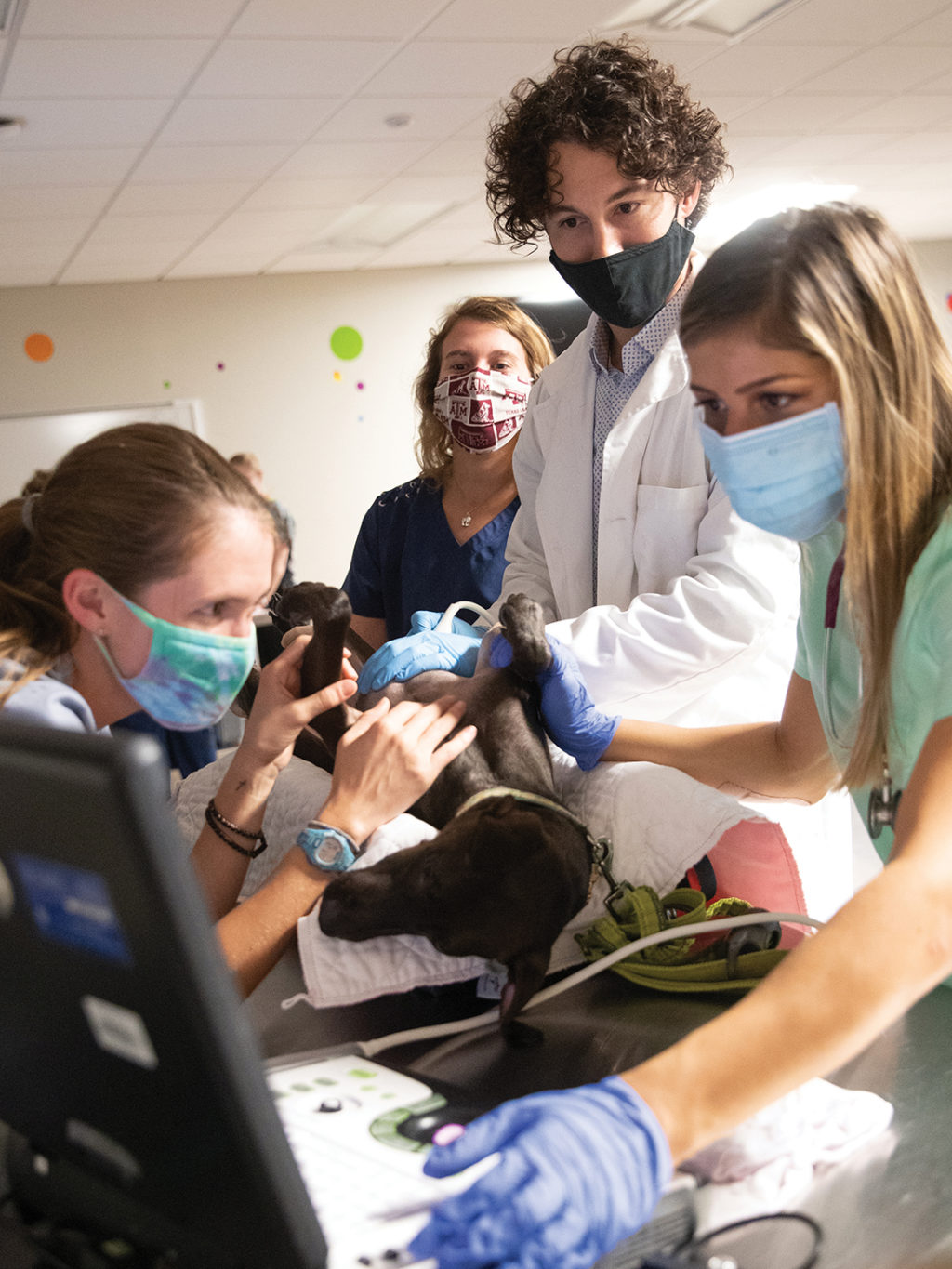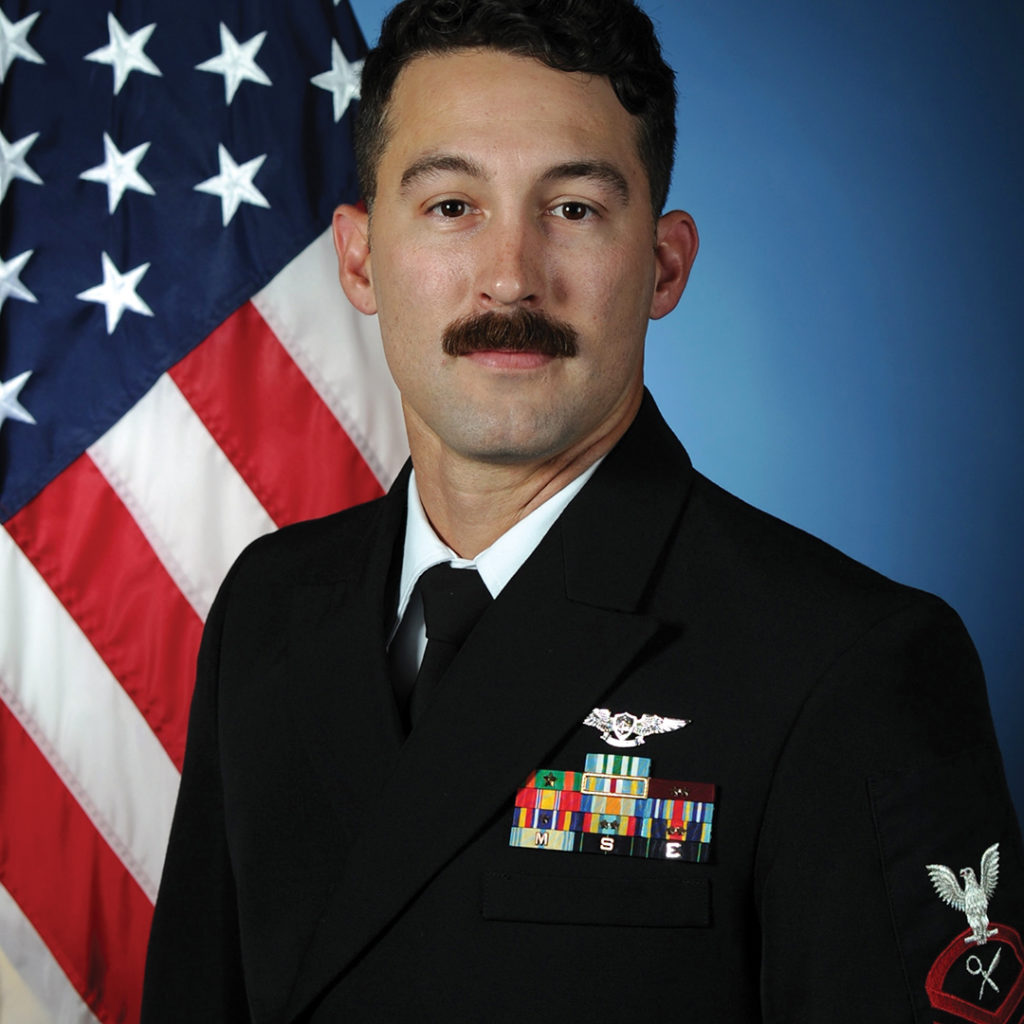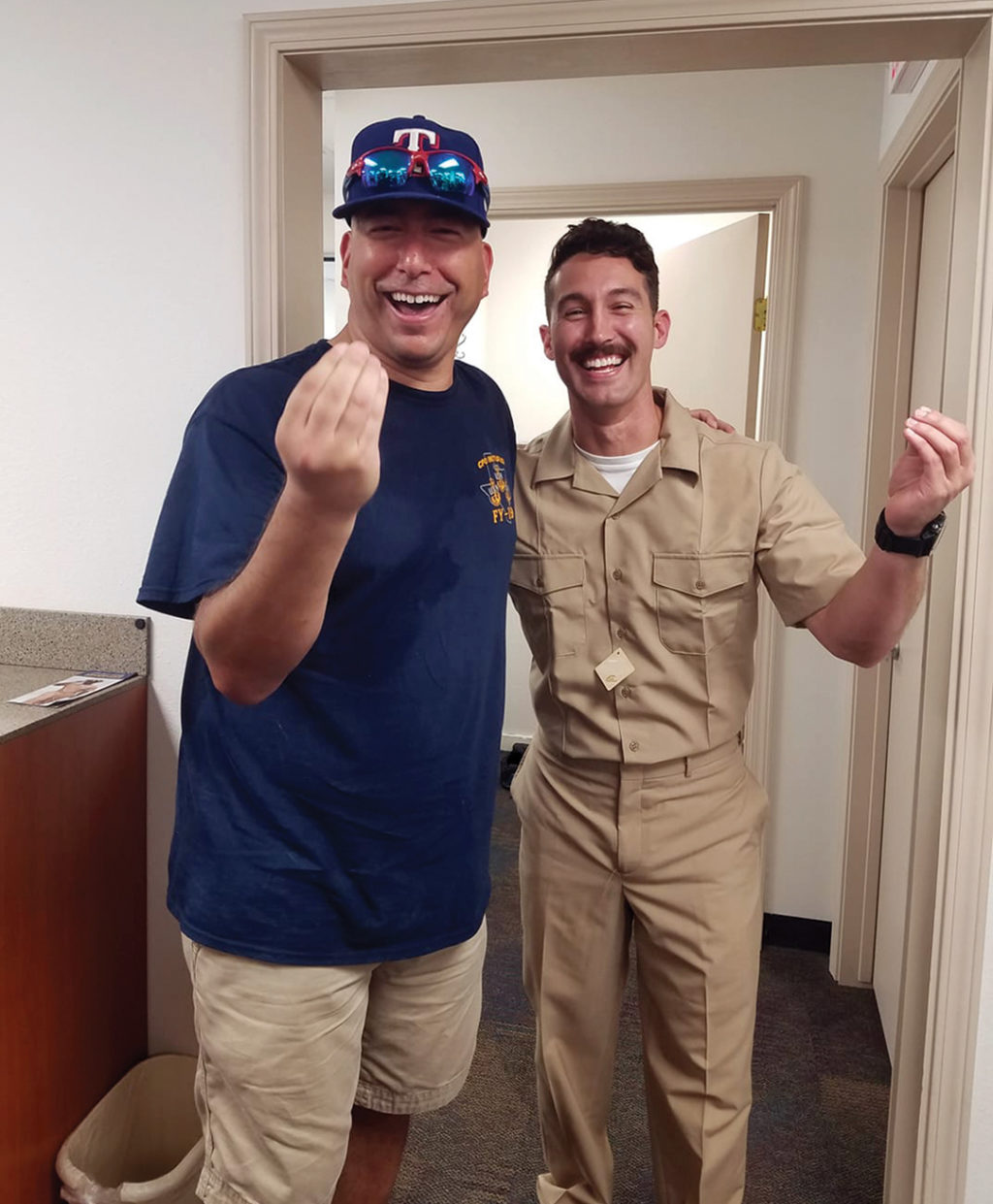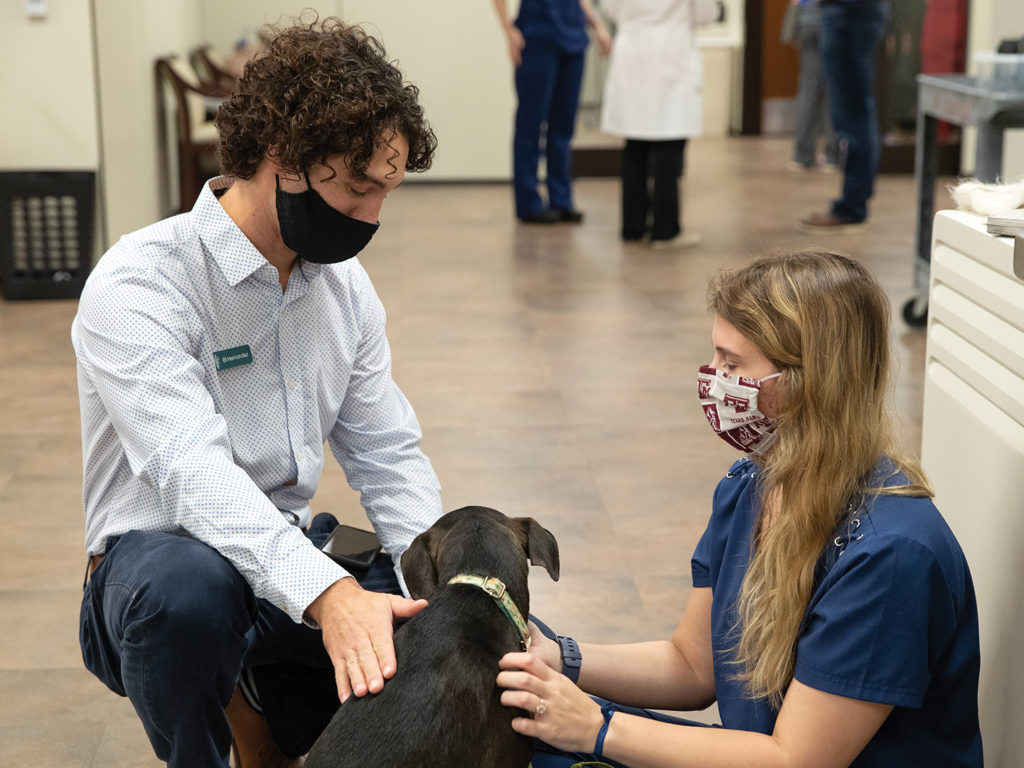Navy Veteran Finds Support At Texas A&M While Pursuing Veterinary Degree
Story by Margaret Preigh, CVMBS Communications

Eli Hernandez, a fourth-year veterinary student at the Texas A&M College of Veterinary Medicine & Biomedical Sciences (CVMBS), calls himself a “vet-squared.” The title is fitting, as he identifies as both a veteran and a soon-to-be veterinarian.
“After high school, I did six years on active duty,” the Lumberton native said. “I was in Japan for my first three years or so, and then I moved to Nevada for my second duty station. I was there for a little over two years before transitioning to the Navy Reserve.”
Following his active duty commitment, Hernandez returned to his home state of Texas with a strong interest in animal care.
“I really just wanted to be a rancher, honestly,” Hernandez said. “The more research I did, I realized that was unfeasible because the amount of money it would take. I settled on the second best thing, which was veterinary medicine. Being a veterinarian was kind of the back-up plan.”
He started working on his veterinary pre-requisites at Blinn, before transferring to Texas A&M. Graduating with the Fightin’ Texas Aggie Class of 2017, Hernandez was set to continue his education at the CVMBS when his plans were interrupted by a call to duty.
“It just so happened that I got picked up for a deployment right as I was finishing my undergrad,” Hernandez said. “I had been accepted to veterinary school with the class of 2021 but had to defer so I could go to Kuwait. There was no getting out of it.”
While he knew he would be returning to veterinary school eventually, Hernandez describes his second deployment as a break from the academic mindset.
“I wasn’t overly focused on veterinary school. I knew that I was coming back to do that, but I didn’t really know anything about how to prepare,” Hernandez said. “Dr. (Glennon) Mays (CVMBS director of recruiting and student services) let me borrow an anatomy book, which I brought with me over there, but I don’t remember ever looking at it.”
Though his deployment provided a break from the world of veterinary medicine, Hernandez continued to exercise his skills in analytic thinking.
“I was doing civilian casualties analysis,” Hernandez said. “They had me looking into allegations that people were submitting in Syria and Iraq. The United States takes all allegations of civilian casualties seriously, so we devoted a lot of human resources to investigating the allegations we were receiving, and I was honored to be a part of that team.”

“In that job, I was taking information, critically analyzing it, and piecing together a whole bunch of stuff to come up with a story that makes sense. Then, I would try to fill in any missing parts to determine if an allegation may have had credibility or not,” Hernandez said. “I feel like the critical thinking aspect has been really beneficial, especially in veterinary school. I hope that it will make me into a better veterinarian someday.”
Hernandez returned to Texas in May 2018 and was preparing to enter the CVMBS in the class of 2022, when in July, he discovered that he had been promoted to E-7, or Chief Petty Officer. While he was proud to have received an advancement achieved by few, the promotion also offered yet another conflict for veterinary school.
“I had to go through a two-month initiation process for E-7, and that was the hardest part about first year for sure,” Hernandez said. “There was a month of overlap where I was expected to be doing stuff every single day, every single night, every weekend for the Navy, and also expected to take care of my school responsibilities. That was really, really tough.”
Beginning his first semester of veterinary school while completing the E-7 initiation process tested Hernandez’s drive and discipline.
“It was almost impossible for me to study. I specifically remember one night, I was sitting in one of the study rooms with a group of people, trying to study for anatomy, but I couldn’t because my phone just kept going off the whole time; it was people that I was going through the initiation with,” Hernandez said.
On top of all of that, Hernandez, who had completed farrier school in 2016 using his GI Bill, also owns a farrier business and continues to service clients. During his second year of veterinary school, he also taught himself the traditional western art of rawhide braiding and started a business as well. Managing so many responsibilities simultaneously forced Hernandez to focus on the task at hand and exhibit persistence.
“It’s one of those things where it’s one foot in front of the next,” Hernandez said. “You can’t look too far out, otherwise you’ll get overwhelmed. You have to take it day by day and just say, ‘OK, make it past this thing and then tomorrow do the same thing over again.’”

And that’s exactly what he did. Despite his success, Hernandez recalls the pressure he felt from handling so many obligations at once.
“I think I struggled with stress last semester. I struggled with stress really bad, to the point where I developed medical issues and I had to take time off to go to medical appointments,” Hernandez said. “That’s not really an uncommon thing, but it was pretty uncommon for me.”
Though his first year at the CVMBS tested Hernandez’s resolve, he said his classmates have helped his transition from active duty to civilian life.
“I know one of the biggest struggles for veterans is the transition going from having that military camaraderie to not having it, so it’s kind of nice having that here (among his veterinary peers) because I feel like it’s made the transition pretty easy,” Hernandez said.
“This has become my close-knit group of friends, whether it’s just because we spend so much time together or because we actually enjoy each other’s company,” he said. “I think it’s a little bit of both.”
When he completes his Doctor of Veterinary Medicine degree, Hernandez plans to expand the care he provides horses beyond his work as a farrier.
“Ever since I went to farrier school, I have absolutely fallen in love with the equine foot. I hope that the AVMA (American Veterinary Medical Association) approves equine podiatry as a new board specialty,” Hernandez said. “I would absolutely love to be one of the first board certified equine podiatrists in the nation, so that’s my goal.”
Combining his tested experience as a farrier with the new skills and knowledge he has learned in veterinary school, Hernandez hopes to discover new insights into the equine foot.
“I would love to have my own clinic that’s set up to do inpatient care for horses that have really, really bad hoof issues, and I would use that opportunity to do more scientific studies on the foot,” Hernandez said. “I want to try to answer questions I have about the best ways to treat certain disease processes in the foot.”
Hernandez’s drive to achieve his goal recently earned him recognition as a 2018 Tillman Scholar, a prestigious award for military veterans and spouses. The Tillman Foundation provides recipients with scholarship funds and professional development opportunities.

“There’s still a very large part of me that has imposter syndrome. It’s like, how in the world did they select me as a Tillman Scholar, because it is such a competitive scholarship and the people who are within that organization are absolutely incredible,” Hernandez said. “Maybe there is something that I do have to contribute on a larger scale, and they just see it in me earlier than I see it in myself.”
Mays, on the other hand, has no doubts about Hernandez, whom Mays believes is capable of completing whatever task he sets his mind to.
“Eli is a life-experienced, mature person,” Mays said. “Considering his youth, military service and accomplishments, and scholastic performance, Eli must be not only committed but time-management conscious. Coordination of military career, academic rigor, and personal life suggests a depth of grit often present in people defined as successful by societal standards.”
While his nontraditional path to veterinary medicine has taken him around the world, Hernandez is glad to have landed back home in Texas.
“A&M has been really great about understanding my military duties and working with me around those, like with my deferment. I think anybody who applies for a deferment gets kind of anxious,” Hernandez said. “But I submitted my request for a deferment and had no issues. They said, ‘OK. Sounds good. See you next year.’
“I do appreciate how good A&M has been to people who are still in the military, or have reserve duties, or whatever,” he said. “It’s really nice.”
###
Note: This story originally appeared in the Spring 2021 edition of CVMBS Today.
For more information about the Texas A&M College of Veterinary Medicine & Biomedical Sciences, please visit our website at vetmed.tamu.edu or join us on Facebook, Instagram, and Twitter.
Contact Information: Jennifer Gauntt, Director of CVMBS Communications, Texas A&M College of Veterinary Medicine & Biomedical Sciences; jgauntt@cvm.tamu.edu; 979-862-4216


